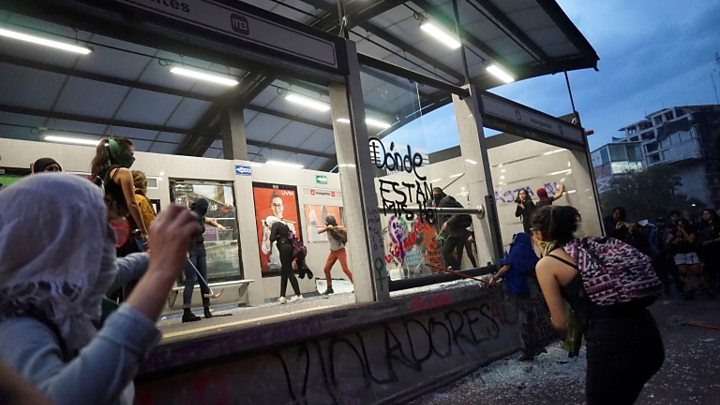Home » Latin America »
Fury fuels historic women’s strike in Mexico
Shocking femicide statistics have prompted a furious reaction from women’s rights groups in Mexico. Anger over the violence is a key part of a one-day national women’s strike in the country.
In the hours before she was murdered, Abigail Guerrero Mondragon had been enjoying her nephew’s sixth birthday. At the low-key family gathering, the 20-year-old law student had been happily playing with the boy and chatting to guests at her mother’s house.
The next morning, her lifeless body was found near some football pitches where the last man she had been seen with worked. Her new boyfriend’s buddy, Juan Velazquez, was detained along with the boyfriend, Ivan, and his cousin, all of whom had been with Abigail in her final moments.
Yet within a day, all three were released without charge. Key pieces of evidence, including used condoms taken from the scene, were lost or never properly recorded.
“(Velazquez) was caked with mud and there was blood on his clothes,” recounts Abigail’s mother, Araceli Mondragon, between deep sobs.
“I went into shock. And because the authorities here in Mexico are so heartless, they forced me to make a statement when I still didn’t even understand what had happened to my daughter, when I couldn’t make sense of anything.”
Abigail’s killing on 11th December 2016 was just one of 10 murders of women and girls that day – crimes which take place every single day in Mexico. It is a statistic which has prompted anger in the capital in recent weeks, especially from Mexico’s feminist and women’s rights groups.
“There have been 8,000 murders of women in the last two years alone, around half of which show the traits of gender-based violence against women,” explains Maria de la Luz Estrada, President of the National Citizens’ Observatory on Femicide which provides legal support to victims’ families.
Two cases sparked the latest protests.
The first was the gruesome killing of a young woman, Ingrid Escamilla, by a man she lived with. He stabbed her, then skinned her body and removed her organs in an attempt to hide the evidence. Days later, in the Xochimilco district of the city, seven-year-old Fátima Cecilia Aldrighett was abducted from the school gates, sexually abused and murdered.
‘I don’t want to be afraid’
Both stories are stomach-churning and appalling. In the subsequent protests in Mexico City, some of the most radical demonstrators clashed with riot police and sprayed graffiti on statues of independence heroes and the walls of historic buildings. The also daubed paint on the Mariana Door, the heavy 19th Century wooden gate of the National Palace.
“I ask all the feminists, with due respect, don’t paint on our doors and our walls, we are working to stop femicides,” said President Andres Manuel Lopez Obrador, who has been roundly criticised as out of touch and insensitive.
In perhaps his most misjudged comments since taking office, he blamed “neoliberalism” for the murder of seven-year-old Fátima.
Maria de la Luz Estrada believes President Lopez Obrador has missed the point entirely.
“Mexico’s young women are saying “I don’t want to be afraid” and “I want to be able to walk home freely”. They are demanding that the new government fulfil its promise to act differently because they said they wouldn’t turn away like previous administrations.”
There was a media and journalism dimension to the demonstrations too. Several of Mexico’s sensationalist newspapers printed photographs of Ingrid Escamilla’s mutilated body, including on their front pages. Outside the offices of one of the newspapers in question, La Prensa, demonstrators set fire to their vehicles and chanted slogans.
‘Full of fury’
An established voice in Mexican gender politics, Maria de la Luz Estrada struggles to hide her exasperation at the criticism being levelled, primarily by men, at young feminist activists.
Their outrage goes beyond the murder of Ingrid or Fátima or Abigail, she says. It is about decades of indifference and widespread impunity in Mexico over the killing of women:
“We have taken to the streets in the past. We have denounced the violence and have never been listened to.”
The new generation has simply had enough, she says.
“They’re saying: ‘if we break things up, now they’re going to listen to us.’ If women keep being harmed and the authorities won’t act, then we’ll just have to protect ourselves.”
But for Araceli Mondragon, this is an intensely personal battle.
Since Abigail was murdered on a football field that December night, she has had nothing but obstruction and obfuscation from the authorities. It was only thanks to support from women’s rights groups that the criminal case against the perpetrator managed to inch forwards.
Juan Velazquez has now been jailed for Abigail’s murder, although his two alleged accomplices are still free.
“I go to these marches and we take action because we’re tired”, says Araceli, spitting out the words with barely-contained disgust.
“We’re full of fury. Why? Because they were our daughters whose lives were taken away in the cruellest way,” her voice breaks again.
“Those who judge us would do well to pray that they’re never in our shoes. Because the day that they are, then they’ll understand.”
Source: Read Full Article




